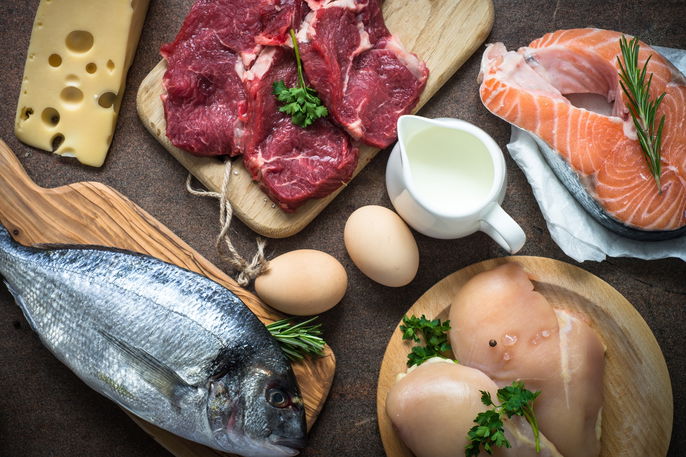Phenylalanine is an essential amino acid that needs to be obtained through food. This amino acid is important for the production of other proteins and for the formation of neurotransmitters like dopamine and epinephrine, which help improve memory and mood.
Phenylalanine is found naturally in the form of L-phenylalanine and D-phenylalanine in protein-rich foods like eggs, soy, cheese, chicken, and beef, and is also sold in the form of a supplement. Phenylalanine is also an ingredient in the artificial sweetener aspartame and is used by the food industry as a sugar substitute.
Phenylalanine should not be consumed by people with phenylketonuria (PKU), a genetic condition in which the body is unable to metabolize phenylalanine, leading to symptoms like seizures and hyperactivity.

Health Benefits
Phenylalanine is an amino acid that plays a role in protein synthesis as well as the production of tyrosine, an amino acid essential to the production of neurotransmitters like epinephrine and dopamine in the body.
The potential health benefits of phenylalanine include:
1. Relieving chronic pain
Phenylalanine has the ability to increase levels of endorphins in the brain. Endorphins are substances that possess a natural analgesic effect and can help reduce chronic pain and discomfort from conditions like osteoarthritis, rheumatoid arthritis, and back pain.
Phenylalanine supplements should only be used as a complementary treatment for these conditions, however, and only when recommended by a doctor or other healthcare provider.
2. Combating stress and anxiety
Phenylalanine plays a role in the production of dopamine, epinephrine, and norepinephrine, neurotransmitters that help regulate mood, improve a sense of well-being, and boost feelings of pleasure.
While phenylalanine supplements could potentially help manage anxiety and depression, further studies are needed to support this.
3. Supporting weight loss
Phenylalanine plays a role in the formation of cholecystokinin, a hormone that transmits signals to the brain to say you are full. By decreasing hunger, consuming foods high in phenylalanine may help you lose weight.
Further studies are needed to confirm a link between phenylalanine and weight loss.
4. Treating vitiligo
Phenylalanine plays a role in the production of melanin, the substance in the body responsible for pigmentation of the skin, hair, and eyes. Vitiligo is a condition characterized by a lack of melanin in the body due to dysfunction of the cells responsible for its production.
Treatment with phenylalanine supplements and UV light exposure helps in the treatment of vitiligo. Applying creams with L-phenylalanine also appears to improve the results.
5. Helping treat a variety of health conditions
Phenylalanine is essential for the formation of tyrosine, an amino acid that plays a role in the production of neurotransmitters like noradrenaline and dopamine, potentially helping to treat symptoms of alcohol withdrawal, attention deficit disorder (ADD), and Parkinson's disease.
Further studies are needed to prove the effectiveness of phenylalanine at treating these conditions.
Differences between phenylalanine and tyrosine
Tyrosine is a nonessential amino acid synthesized from phenylalanine that can also be obtained directly from foods like cheese, fish, and nuts.
Phenylalanine is an essential amino acid that is not produced in the body, meaning it needs to be obtained through foods like milk, beef, cheese, and eggs, or supplements. Phenylalanine cannot be consumed by people with phenylketonuria (PKU).
Food sources
Foods high in phenylalanine include:
- Meat, such as pork, beef, chicken, duck, and turkey;
- Dairy products, like cheese, milk, butter, cream, and yogurt;
- Soy products, such as soy sauce, tofu, soy milk, and tempeh;
- Nuts and seeds, like peanuts, pumpkin seeds, chia seeds, and sunflower seeds;
- Fish and seafood, like sardines, salmon, tuna, shrimp, lobster, and oysters;
- Legumes, like beans, chickpeas, and lentils;
- Wheat products, such as cakes, white bread, and whole grain bread;
- Smoked and cured meats, such as sausage, bacon, and prosciutto.
Products containing aspartame, an artificial sweetener used as a sugar substitute in soft drinks and sweets, are also rich in phenylalanine.
Is phenylalanine bad for you?
In healthy individuals, consuming foods containing phenylalanine or taking phenylalanine supplements is not harmful.
People with phenylketonuria (PKU) can only consume small quantities of this amino acid. This is because phenylketonuria disrupts the conversion of phenylalanine into tyrosine, resulting in a buildup of phenylalanine in the blood that can cause problems like hyperactivity, seizures, and skin issues.
The amount of phenylalanine that people with PKU can consume varies by age and should be determined by a doctor.






























